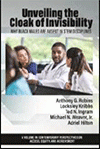
Unveiling the Cloak of Invisibility
Why Black Males are Absent in STEM Disciplines
Edited by:
Anthony G. Robins, Robert Morris University
Locksley Knibbs, Florida Gulf Coast University
Ted N. Ingram, Bronx Community College
Michael N. Weaver Jr, University of Wisconsin Madison
Adriel A. Hilton, Southern University at New Orleans
A volume in the series: Contemporary Perspectives on Access, Equity, and Achievement. Editor(s): Chance W. Lewis, University of North Carolina at Charlotte.
Published 2023
This book explores why Black men continue to be severely underrepresented in the STEM disciplines. It provides chapters that explore factors that lead to underrepresentation of Black males in STEM (e.g., societal traditions of what type of work is appropriate; the ruptured pipeline that leads to higher rates of attrition at every level of career development; barriers in science fields such as subtle and overt discrimination; and inequitable resources and opportunities). The premise of this volume is if Black males are to compete in an emerging global economy fueled by rapid innovation and marked by an astonishing pace of technological breakthroughs, they must be present.
The book makes new contributions to the field. The collective of higher education professionals and change agents whom are tied to STEM bring cutting-edge thinking in how best to address the leaky STEM pipeline which has left the industry/workforce void of talented Black men. The volume promises timely, relevant and emergent scholarship and perspectives for STEM leadership, scholars and supporters. It provides promising practices (best practices) and recommendations in recruiting and retaining Black males in STEM disciplines and the competitive market place.
CONTENTS
Foreword, Chester Thompson. Introduction, Anthony G. Robins. Uncovering a Pathway Towards Equity in STEM Education for African American Males, Deborah A. Harmon & Cheryl L. Price. All Things Being Equal (Not): Undergraduate Research Mentoring of Black Males in STEM, Joni Schwartz. The Influence of Microaggressions on Black Boys’ Pursuit of STEM, Brea M. Banks, Keeley Hynes, Alexandra V. Horton, & Khyati Verma. The Role of Institutional Level/Strengths-Based Approaches in Fueling Black Males’ Success Strategies, J. Lynn Gazley & Patricia B. Campbell. Multifarious Representations of Black Families: Counterstories of the Influence of Black Families on Black Males’ Engineering Journeys, DeLean Tolbert Smith. Could Culturally Tailored Study Skills Strategies Be The Panacea to Black Males Being Missing in STEM Professions? Anthony G. Robins & Christopher Robinson. Social and Academic Influences on STEM Career Aspirations: The Experiences of Black Male Doctoral Students at an HBCU, Andrea Tyler, Jhan Doughty-Berry, Claire Jang, Courtney Wilkerson. Promoting Positive STEM Identity and Achievement among African American Males: Individual and Contextual Considerations, Leslie K. Grier. Why Aren’t More Black Men Interested in Psychology? Naomi M. Hall & Jason M. Jones. “Because Representation Matters”: Supporting Black Males to and Through STEM Graduate School, Kirk D. Rogers, Jr., James Crawford, & Ramon Stephens. Conclusion, Locksley Knibbs. Biographies.
-
Paperback979-8-88730-175-4
Web price: $45.04 (Reg. 52.99)
-
Hardcover979-8-88730-176-1
Web price: $80.74 (Reg. 94.99)
- eBook979-8-88730-177-8

- EDU048000 - EDUCATION: Inclusive Education
- EDU015000 - EDUCATION: Higher
- EDU029030 - EDUCATION: TEACHING METHODS & MATERIALS: Science & Technology
-
 Advancing Inclusive Excellence in Higher Education
Practical Approaches to Promoting Diversity, Equity, Inclusion, and Belonging
Advancing Inclusive Excellence in Higher Education
Practical Approaches to Promoting Diversity, Equity, Inclusion, and Belonging
-
 Developing Culturally Responsive Learning Environments in Postsecondary Education
Developing Culturally Responsive Learning Environments in Postsecondary Education
-
 Economic, Political and Legal Solutions to Critical Issues in Urban Education and Implications for Teacher Preparation
Economic, Political and Legal Solutions to Critical Issues in Urban Education and Implications for Teacher Preparation
-
 Imagining the Future
Historically Black Colleges and Universities - A Matter of Survival
Imagining the Future
Historically Black Colleges and Universities - A Matter of Survival
-
 Post-Secondary Planning for All
Approaches to College and Career Readiness Counseling for Special Populations
Post-Secondary Planning for All
Approaches to College and Career Readiness Counseling for Special Populations
-
 Preparing to Lead
Narratives of Aspiring School Leaders in a "Post"-COVID World
Preparing to Lead
Narratives of Aspiring School Leaders in a "Post"-COVID World
-
 Un-Silencing Youth Trauma
Transformative School-Based Strategies for Students Exposed to Violence & Adversity
Un-Silencing Youth Trauma
Transformative School-Based Strategies for Students Exposed to Violence & Adversity

